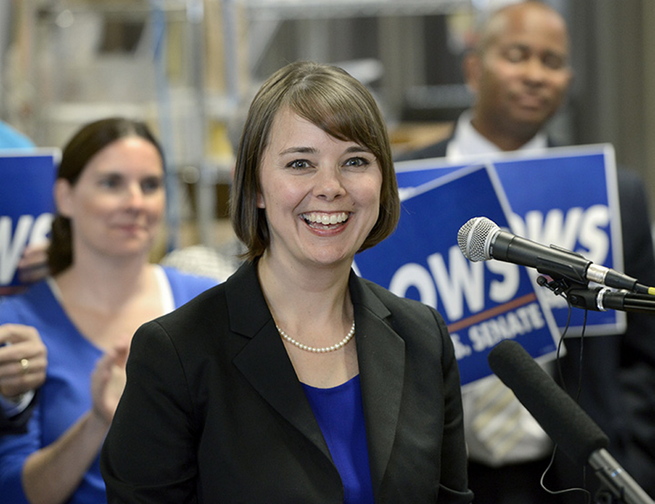WASHINGTON — Democrat Shenna Bellows officially joined Maine’s 2014 race for U.S. Senate on Wednesday, becoming the first – and perhaps only – candidate to challenge Sen. Susan Collins as the popular Republican seeks a fourth term in Congress.
“Our democracy is too important not to have a full and fair debate in this race about the solutions that will move our country forward,” Bellows said in announcing her candidacy.
A Hancock County native who led the American Civil Liberties Union of Maine for eight years, Bellows called for greater “courage and honesty in Washington” and pledged to focus her campaign on protecting constitutional freedoms and improving Maine’s economy and environment.
Bellows, 38, has strong credentials in some Maine political circles for her high-profile roles in recent campaigns to legalize same-sex marriage and restore same-day voter registration. Her candidacy appears to have energized some Democrats in a race overshadowed so far by the races for governor and Maine’s 2nd Congressional District seat.
But Collins presents a formidable challenge to a first-time candidate.
In addition to statewide name recognition, Collins has more than $2 million in her re-election campaign account. Recent polls suggest that Collins was popular with many middle-of-the-road Republicans, Democrats and independents in Maine even before she got national press for her efforts to broker a bipartisan deal to reopen the federal government and avoid a federal default.
“I think (Bellows) will put up a good fight, but she is definitely the underdog,” said Jim Melcher, political science professor at the University of Maine-Farmington.
Bellows is, to date, the only candidate to declare against Collins despite persistent rumors of a potential primary challenge from the Republicans’ conservative, libertarian or tea party factions.
While not denying the tough campaign ahead, Bellows tried Wednesday to focus attention on her campaign platform rather than the woman she hopes to unseat next year. She predicted that her track record of building coalitions of “unusual parties” on civil liberties issues and her statewide campaign experience will help her to build a grass-roots activist and donor base.
Bellows officially launched her campaign in Ellsworth – a few miles from her hometown of Hancock – during the first stop of a five-day tour of all 16 Maine counties. An afternoon event at the Rising Tide Brewery in Portland drew more than 100 supporters.
In an interview earlier Wednesday, Bellows said she decided to enter the Senate race while she was working on a bill in the Maine Legislature last spring to require police to get a warrant before accessing a person’s cellphone records. Lawmakers passed the bill and subsequently overrode a veto by Gov. Paul LePage.
“What I realized is, we need this type of leadership at the federal level to restore our constitutional freedoms,” Bellows said.
If elected, Bellows said, she would work to repeal the Patriot Act, to “stop NSA surveillance on ordinary Americans” and to halt indefinite detention policies authorized by the National Defense Authorization Act.
Collins voted for the Patriot Act, as did most other lawmakers, and has defended NSA phone surveillance activities as necessary anti-terrorism tools. She voted for the defense bill but co-sponsored an unsuccessful amendment to eliminate indefinite detention of Americans linked to terrorist groups.
Asked for a comment on Bellow’s announcement, a Collins’ spokesman sent a reply that touted the senator’s work to help “end the government shutdown, get people back to work, and avoid default on our nation’s debt.” The statement did not
mention Bellows.
“Election day is more than a year away, and Senator Collins has more than a full-time job to do,” said her spokesman, Kevin Kelley.
Bellows’ constitutional messages are likely to resonate with some liberal Democrats and libertarian Republicans who are angry with what they see as repeated government intrusions on constitutional rights since the Sept. 11 terrorist attacks.
As executive director of the civil liberties union, Bellows was often front and center during legislative debates over constitutional issues. Her high-profile role in the battle to legalize same-sex marriage also earned her name recognition in progressive political circles.
Sandy Maisel, a veteran political science professor at Colby College, said Bellows has a “distinguished career” representing the interests of people whose believe their civil liberties are violated or in jeopardy.
“By all accounts, she has been very good at it,” Maisel said. “It’s important to have competitive elections and I think she will be a credible … opponent against Susan Collins.”
That said, Maisel called Collins “the odds-on favorite” and said the incumbent is “probably in as strong a position as any Republican across the country,” in part because of her efforts to end this month’s government shutdown.
Melcher, at UMaine-Farmington, noted that Collins angered some on the left and the far right for her role in the shutdown debate. Democrats blasted her for opposing stripped-down Democratic proposals to reopen the government while tea party Republicans criticized her for not joining the effort to use the budget to defund the Affordable Care Act.
Maine’s political parties have, to date, focused largely on the 2014 races for governor and the 2nd District, which has an open seat for the first time in more than a decade. And unless Collins appears vulnerable, neither the state parties nor the national parties are likely to devote large sums to the race.
Kevin Miller can be contacted at 317-6256 or at:
kmiller@pressherald.com
Twitter: KevinMillerDC
Send questions/comments to the editors.



